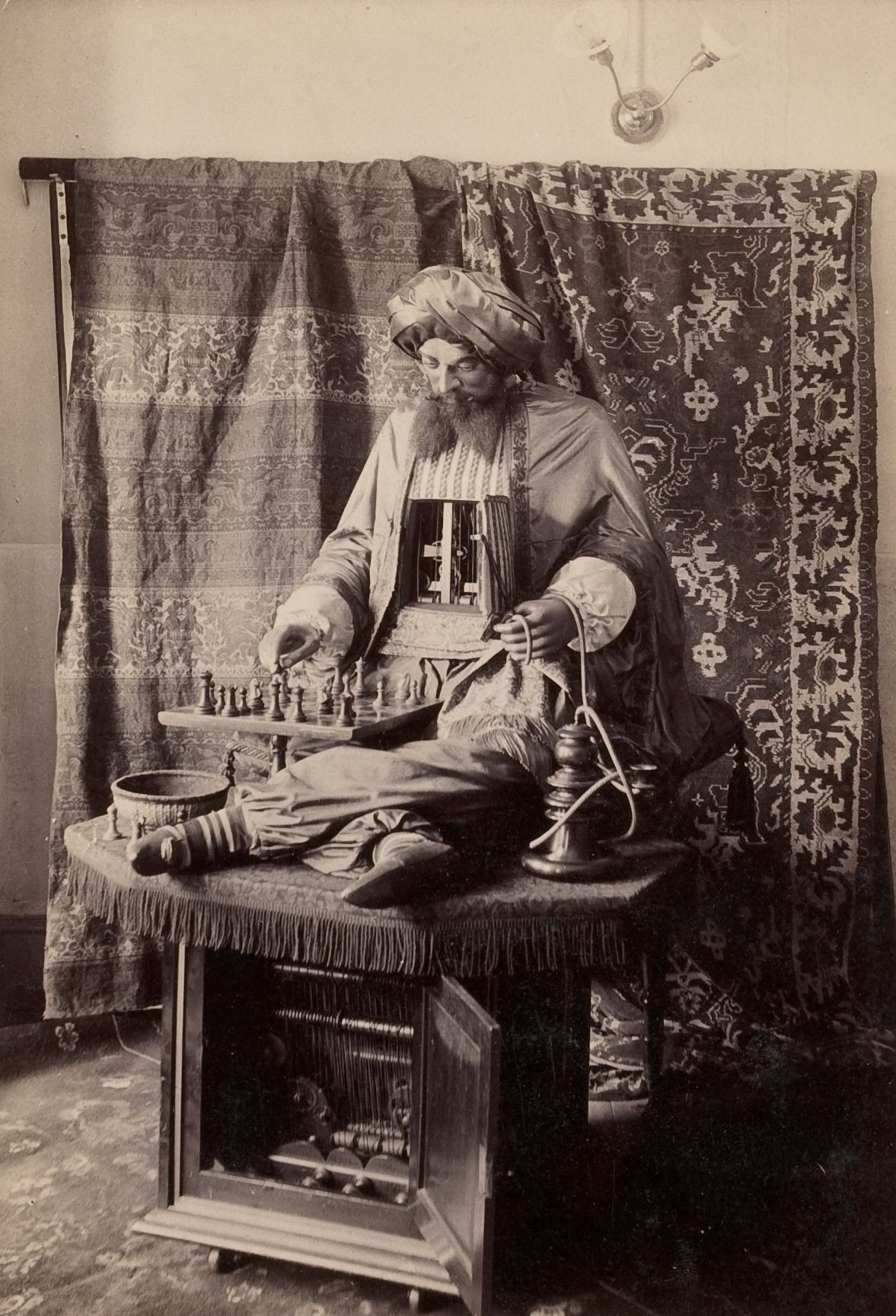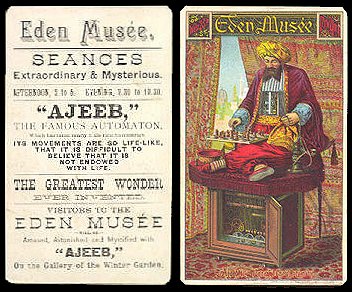Ajeeb on:
[Wikipedia]
[Google]
[Amazon]

 Ajeeb was a
Ajeeb was a ChessBase :: Spotlights :: Der Schachtürke

 Ajeeb was a
Ajeeb was a chess
Chess is a board game for two players, called White and Black, each controlling an army of chess pieces in their color, with the objective to checkmate the opponent's king. It is sometimes called international chess or Western chess to dist ...
-playing "automaton
An automaton (; plural: automata or automatons) is a relatively self-operating machine, or control mechanism designed to automatically follow a sequence of operations, or respond to predetermined instructions.Automaton – Definition and More ...
", created by Charles Hooper (a cabinet maker), first presented at the Royal Polytechnical Institute in 1868. A particularly intriguing piece of faux mechanical technology
Technology is the application of knowledge to reach practical goals in a specifiable and Reproducibility, reproducible way. The word ''technology'' may also mean the product of such an endeavor. The use of technology is widely prevalent in me ...
(while presented as entirely automated, it in fact concealed a strong human chess player inside), it drew scores of thousands of spectators to its games, the opponents for which included Harry Houdini, Theodore Roosevelt
Theodore Roosevelt Jr. ( ; October 27, 1858 – January 6, 1919), often referred to as Teddy or by his initials, T. R., was an American politician, statesman, soldier, conservationist, naturalist, historian, and writer who served as the 26t ...
, and O. Henry.
Ajeeb's name was derived from the Arabic
Arabic (, ' ; , ' or ) is a Semitic language spoken primarily across the Arab world.Semitic languages: an international handbook / edited by Stefan Weninger; in collaboration with Geoffrey Khan, Michael P. Streck, Janet C. E.Watson; Walter ...
word عجيب (''ʿajīb'') meaning "wonderful, marvelous." The genius behind the device were players such as Harry Nelson Pillsbury
Harry Nelson Pillsbury (December 5, 1872 – June 17, 1906) was an American chess player. At the age of 22, he won one of the strongest tournaments of the time (winning the Hastings 1895 chess tournament), but his illness and early death prevent ...
(1898–1904), Albert Beauregard Hodges, Constant Ferdinand Burille
Constant Ferdinand Burille (born 30 August 1866 – died October 1914, Boston) was an American chess master.
He was a Bostonian born in Paris (according to another source - born in Boston), Burille was a member of a group of Boston chess players ...
, Charles Moehle
Charles Moehle (Möhle) (26 November 1859, New York – 1898) was an American chess master.
He took 3rd at New York 1880 (the 5th American Chess Congress won by George Henry Mackenzie), and shared 2nd, behind Jackson Whipps Showalter, at Cincinna ...
, and Charles Francis Barker. Moehle, for instance, gained further popularity playing chess in the United States, where the contraption was also exhibited in the Eden Museum in 1885 and Coney Island in 1915. Solomon Lipschuetz was one of Ajeeb's notable opponents during this period. The machine also played checkers
Checkers (American English), also known as draughts (; British English), is a group of strategy board games for two players which involve diagonal moves of uniform game pieces and mandatory captures by jumping over opponent pieces. Checkers ...
, matching against figures such as 1920s American champ Sam Gonotsky
Samuel Gonotsky (born in the Russian Empire, 1902; emigrated to the United States, 1906; died in Hurley Hospital, Detroit, of pleural tuberculosis, April 5, 1929) was a leading American checkers, or English draughts, player in the Two-Move Era (186 ...
, who would also direct the machine under the ownership of Hattie Elmore.
In the history of such devices, it succeeded the "Mechanical Turk
The Turk, also known as the Mechanical Turk or Automaton Chess Player (german: Schachtürke, ; hu, A Török), was a fraudulent chess-playing machine constructed in the late 18th century. From 1770 until its destruction by fire in 1854 it wa ...
" and preceded "Mephisto
Mephisto or Mephistopheles is one of the chief demons of German literary tradition.
Mephisto or Mephistopheles may also refer to:
Film and television
* ''Méphisto'', a 1931 French film
* Mephisto (1981 film), ''Mephisto'' (1981 film), a German- ...
".References
History of chess Chess automatons 1868 in chess 19th-century robots 19th-century hoaxes {{Chess-stub